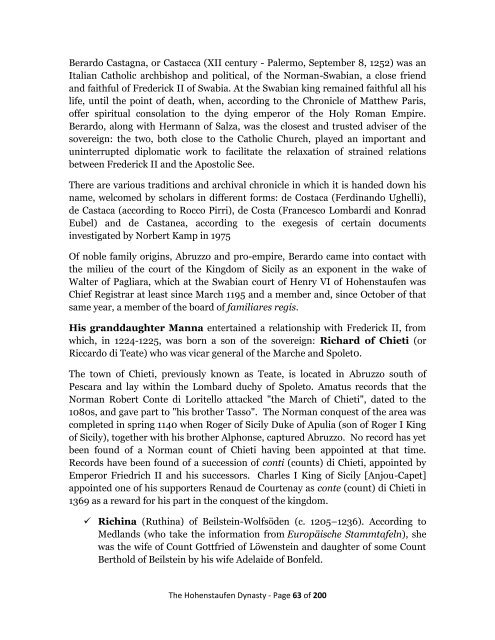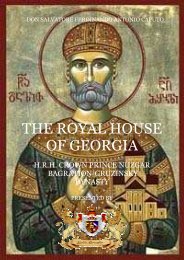here - Nobility Associations
here - Nobility Associations
here - Nobility Associations
Create successful ePaper yourself
Turn your PDF publications into a flip-book with our unique Google optimized e-Paper software.
Berardo Castagna, or Castacca (XII century - Palermo, September 8, 1252) was an<br />
Italian Catholic archbishop and political, of the Norman-Swabian, a close friend<br />
and faithful of Frederick II of Swabia. At the Swabian king remained faithful all his<br />
life, until the point of death, when, according to the Chronicle of Matthew Paris,<br />
offer spiritual consolation to the dying emperor of the Holy Roman Empire.<br />
Berardo, along with Hermann of Salza, was the closest and trusted adviser of the<br />
sovereign: the two, both close to the Catholic Church, played an important and<br />
uninterrupted diplomatic work to facilitate the relaxation of strained relations<br />
between Frederick II and the Apostolic See.<br />
T<strong>here</strong> are various traditions and archival chronicle in which it is handed down his<br />
name, welcomed by scholars in different forms: de Costaca (Ferdinando Ughelli),<br />
de Castaca (according to Rocco Pirri), de Costa (Francesco Lombardi and Konrad<br />
Eubel) and de Castanea, according to the exegesis of certain documents<br />
investigated by Norbert Kamp in 1975<br />
Of noble family origins, Abruzzo and pro-empire, Berardo came into contact with<br />
the milieu of the court of the Kingdom of Sicily as an exponent in the wake of<br />
Walter of Pagliara, which at the Swabian court of Henry VI of Hohenstaufen was<br />
Chief Registrar at least since March 1195 and a member and, since October of that<br />
same year, a member of the board of familiares regis.<br />
His granddaughter Manna entertained a relationship with Frederick II, from<br />
which, in 1224-1225, was born a son of the sovereign: Richard of Chieti (or<br />
Riccardo di Teate) who was vicar general of the Marche and Spolet0.<br />
The town of Chieti, previously known as Teate, is located in Abruzzo south of<br />
Pescara and lay within the Lombard duchy of Spoleto. Amatus records that the<br />
Norman Robert Conte di Loritello attacked "the March of Chieti", dated to the<br />
1080s, and gave part to "his brother Tasso". The Norman conquest of the area was<br />
completed in spring 1140 when Roger of Sicily Duke of Apulia (son of Roger I King<br />
of Sicily), together with his brother Alphonse, captured Abruzzo. No record has yet<br />
been found of a Norman count of Chieti having been appointed at that time.<br />
Records have been found of a succession of conti (counts) di Chieti, appointed by<br />
Emperor Friedrich II and his successors. Charles I King of Sicily [Anjou-Capet]<br />
appointed one of his supporters Renaud de Courtenay as conte (count) di Chieti in<br />
1369 as a reward for his part in the conquest of the kingdom.<br />
Richina (Ruthina) of Beilstein-Wolfsöden (c. 1205–1236). According to<br />
Medlands (who take the information from Europäische Stammtafeln), she<br />
was the wife of Count Gottfried of Löwenstein and daughter of some Count<br />
Berthold of Beilstein by his wife Adelaide of Bonfeld.<br />
The Hohenstaufen Dynasty - Page 63 of 200



